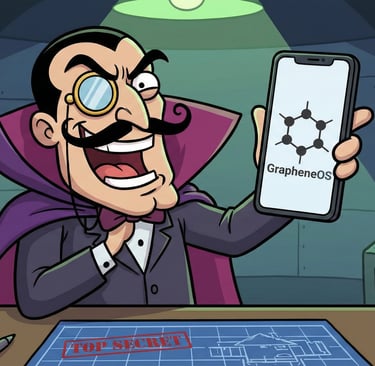Graphene OS: The "Criminal" Operating System That’s Actually Just… Better
Is Graphene OS for supervillains, or have the French simply forgotten their roots in freedom?
TECHOPEN SOURCEPRIVACY
11/25/20252 min read


There is a strange myth floating around the internet—and apparently in some police departments—that Graphene OS is the digital equivalent of a getaway car. If you use it, the logic goes, you must be hiding something. You must be a spy, a drug lord, or a villain from a Mission Impossible movie.
But if you actually look under the hood, the reality is much more boring (and much more impressive). GrapheneOS isn't for criminals; it’s for people who think their phone shouldn't spy on them.
I'm a Graphene Os user since i discover it 5 years ago and It growth a lot: Here are 5 reasons why GrapheneOS is about privacy and control, not robbery, drug selling or human sacrifice.
1. It’s Hardening, Not Hiding
Let’s get one thing straight: GrapheneOS doesn't have a "James Bond" button. There are no secret, smoke-filled chat rooms or "fake Snapchat" features designed to self-destruct evidence. Those features exist, but they come from shady, illegitimate third-party forks, not GrapheneOS.
GrapheneOS is a serious security engineering project. It is arguably the most hardened version of Android in existence, designed to resist intrusions from state-level actors and commercial spyware. It is fully open source, meaning anyone can audit the code. It doesn't rely on "security through obscurity" (hiding how it works); it relies on security through... well, actually being secure.
2. We Don’t Hate Google; We Just Put It in a Box
A lot of users switch to GrapheneOS not to hide from the police, but to take a break from Google’s all-seeing eye.
On a standard phone, Google Play Services has the keys to the castle. On GrapheneOS, Google apps are treated like any other untrusted software. We put them in a "sandbox." They can run, they can work (yes, even your banking apps usually work fine), but they can’t rifle through your files or track your location unless you explicitly say so.
It’s not about doing illegal things; it’s about deciding that a calculator app doesn't need to know your GPS coordinates.
3. It Actually Makes Android Better for Everyone
If GrapheneOS is the "bad guy," why does it keep helping the "good guy"?
GrapheneOS has a track record of developing security improvements that are so good, they end up getting adopted by the official Android Open Source Project (AOSP). The developers often collaborate informally and swap patches with Android security teams. If this is a tool for criminals, it’s doing a terrible job by constantly helping Google make phones safer for the general public.
4. Privacy Is a Right, Not a confession
There is a disturbing trend—often pushed by authoritarian logic—that equates "wanting privacy" with "having something to hide."
Encryption and privacy aren't suspicious activities; they are basic rights protected by the European Union and the GDPR. The rhetoric used to attack GrapheneOS is the same rhetoric used to push for "Chat Control" and attack encrypted apps like Signal or Proton.
Using a secure phone doesn't make you a criminal any more than closing your curtains makes you a conspiracy theorist.
5. Blame the Arsonist, Not the Matches
Open-source developers cannot control who uses their software. Blaming GrapheneOS because a criminal uses it is like banning matches because of arsonists, or banning cash because of money laundering.
The irony here is palpable. In places like Catalonia, where police have reportedly profiled GrapheneOS users, the authorities themselves were embroiled in the Pegasus scandal—using actual spyware sold to governments to surveil activists.
GrapheneOS is a litmus test. If we criminalize a transparent, verifiable, free operating system just because it works too well, we are setting a dangerous precedent for all privacy technology.
